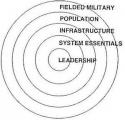Hi Ken,
You know that is a very valid line of thought. In any course these days, there seems to be all the things that have to be taught in order to ensure the student gets to the baseline. Someone always crams more requirements into the baseline while leaving little time to explore how those ideas fit and can be used - sometimes I wonder if the purpose of PME is to build better leadership potential, or just to cover the latest crisis of the day.
I'd also say that some of those injected things often seem to remain in a POI long after the crisis passes, or is relevant. Some courses are more dynamic, but overall it seems that because of the nature of change/adaptation (we talked that one in another thread), most courses reflect POIs more relevant to the past.
The answer on the surface would appear to build in more time so we could do both - check the required blocks and spend some time looking forward. However, it seems to be a zero sum gain. Only so much is going to get funded, and there is the issue of getting bodies back from the schoolhouse into jobs that must be filled. So it would seem to be serious about changing education and training is going to require more people and more money so we can invest more into the people - which always gets me back to the observation about if you want to see what is really important to someone look comparatively at what they spend their money on.
I'd also say that there are those rare instructors who are passionate about building leaders, and will do everything they can to prepare students for the challenges ahead. They seem to be able to find a way to balance meeting requirements and building leaders who can face the challenges ahead. Sometimes this may mean just providing relevant context to the required subject matter. Sometimes it means starting at the required place as written, but willing to depart as the students become more participatory and take the conversation where it needs to go.
Finally, I always worry about the bigger rucksack. It sounds great until someone makes a packing list full of stuff that used to go in the dufflebag, but now goes in the MOLLE. If we did have more bodies and more $$$ would we really trust ourselves to leave white space and fund things like week long staff rides for everybody? We have a cultural A type predisposition to wire things tighter then the crack of dawn. We efface that type of inflexibility in many other ways as well - and inhibits our finding solutions that are timely and practical, but unorthodox and might invite criticism if they don't work out perfect.
If we want to change the nature of PME and training, I think we really have to get to how our service culture influences our approach. Guys like Tom & RTK are leading the charge on this, but it may take awhile to permeate out to the branches.
Regards, Rob





 ).
).








 ) and it needed to be stopped long ago; a great deal of that is related to the rather stupid bureaucratic way we 'justify' the staffing of instructors and cadre.
) and it needed to be stopped long ago; a great deal of that is related to the rather stupid bureaucratic way we 'justify' the staffing of instructors and cadre.


Bookmarks